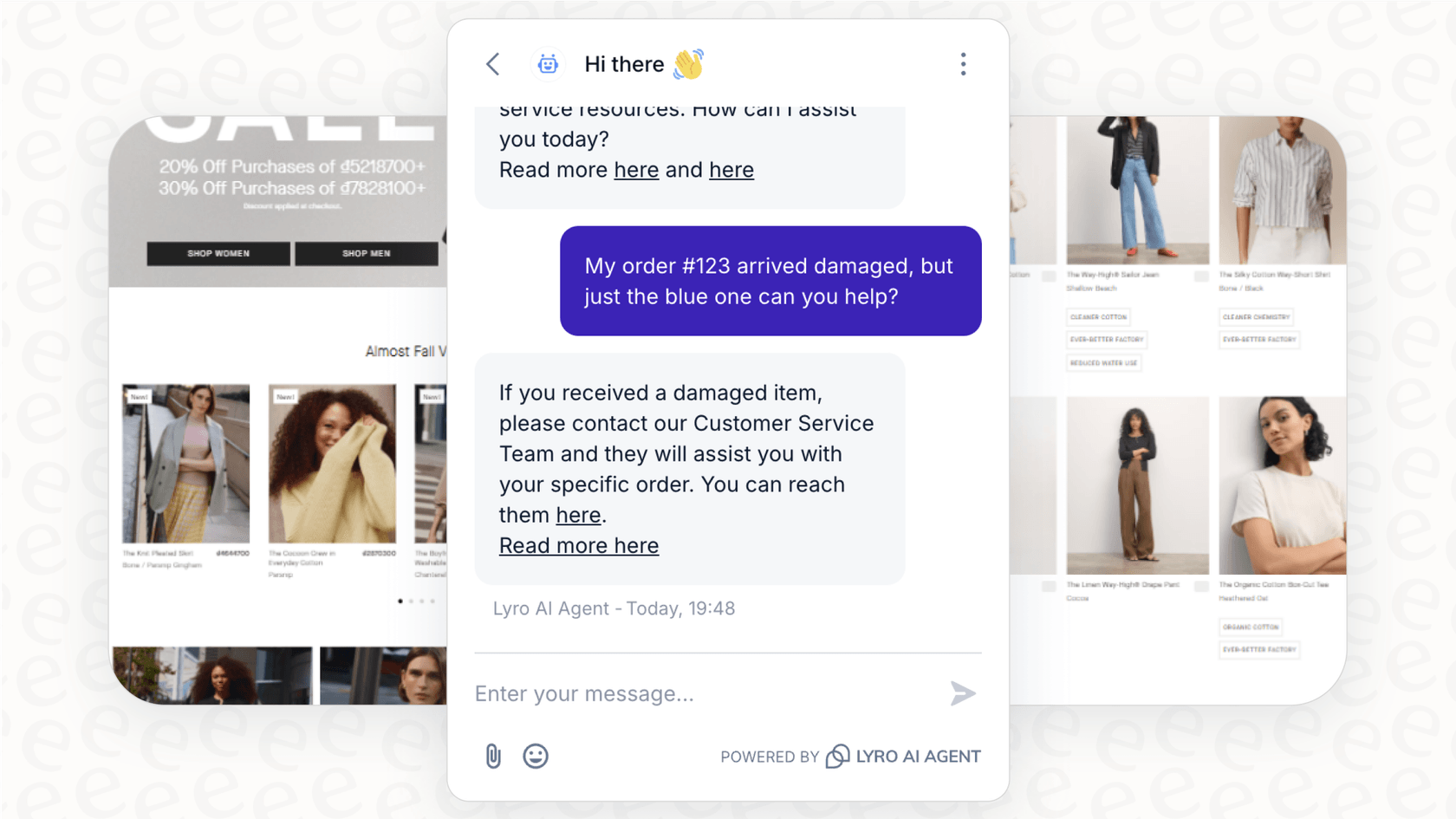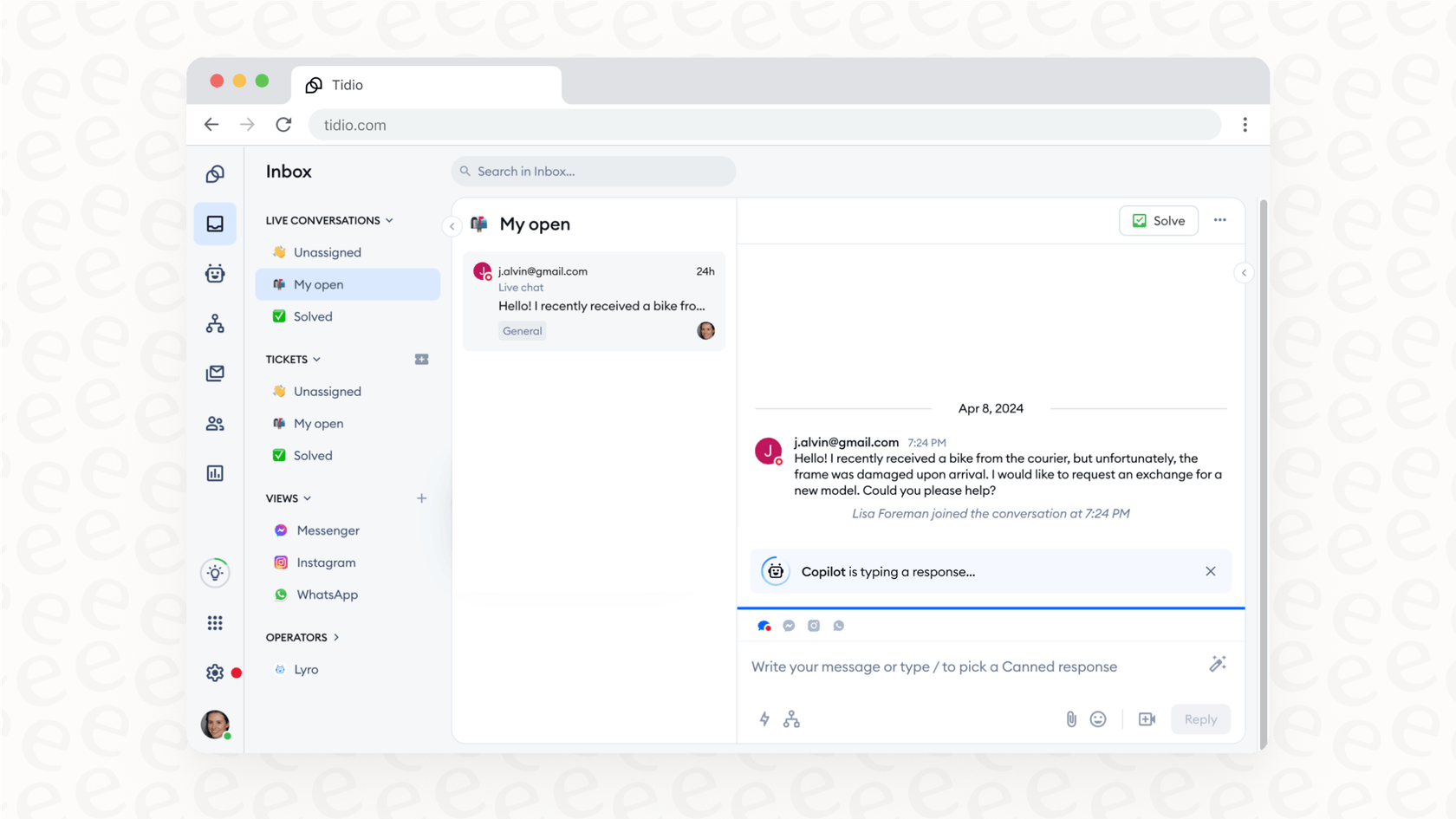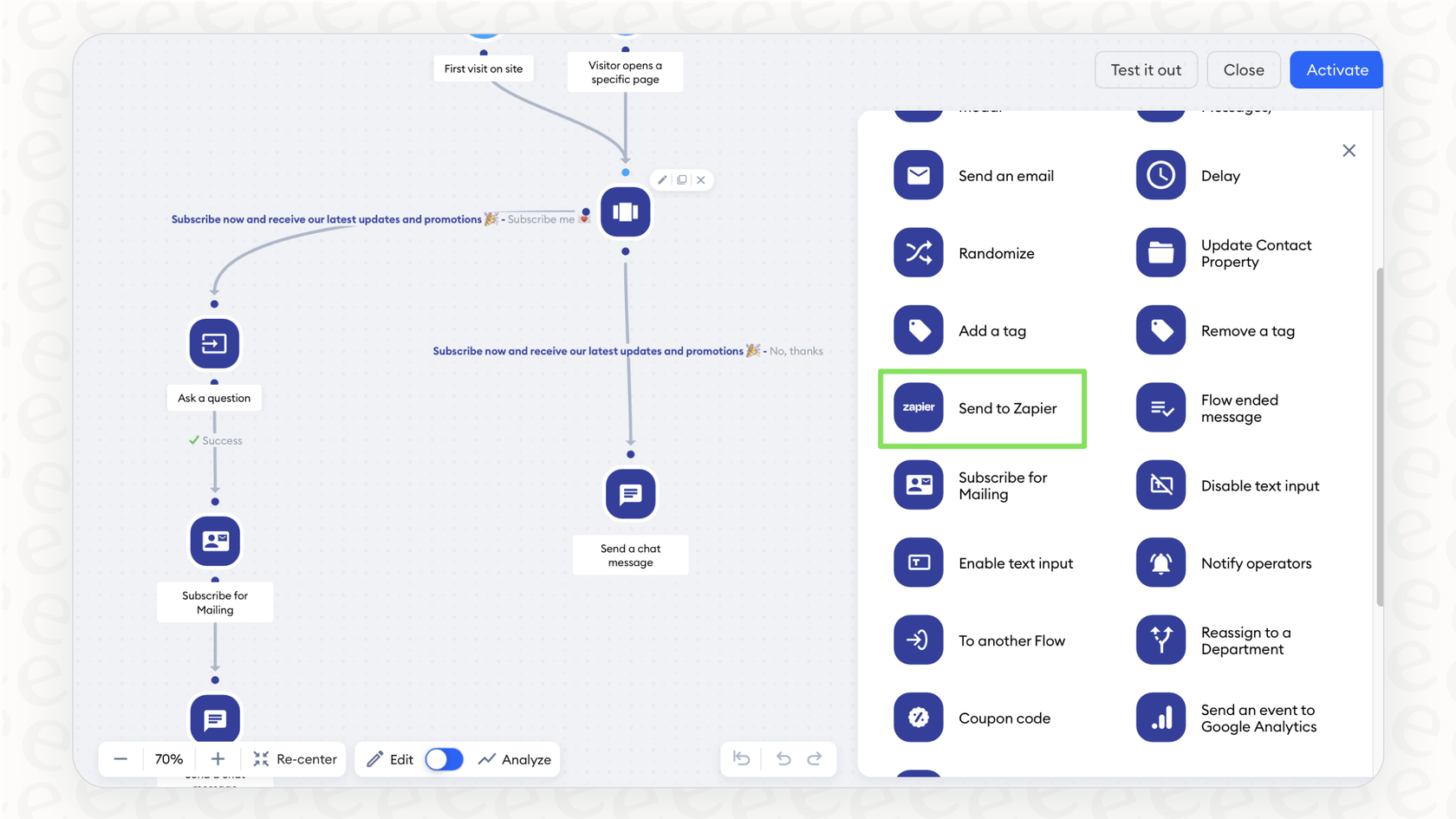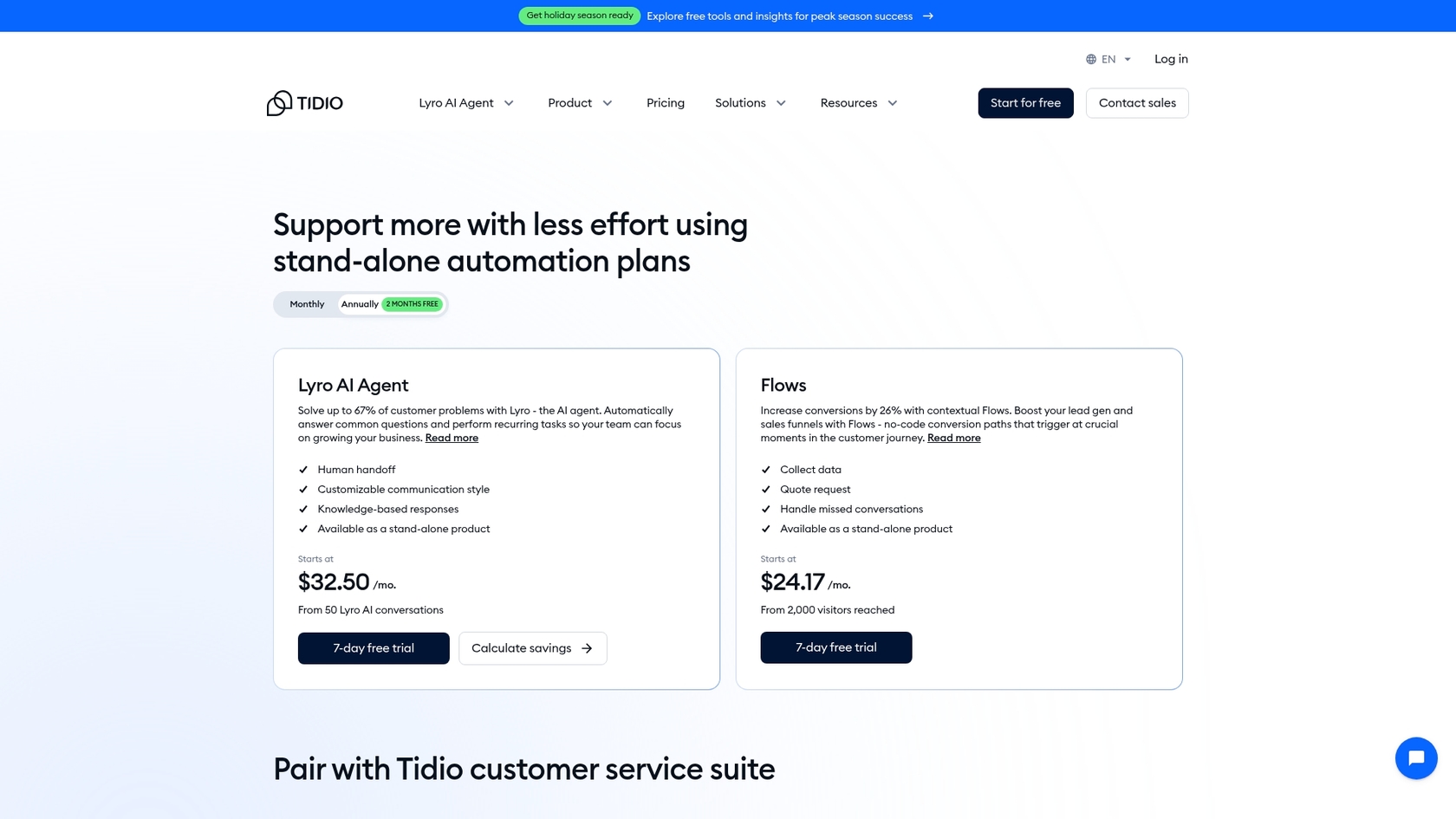
Picking the right customer service platform can feel like a huge commitment. You’re not just looking for a way to talk to customers; you need a tool that actually saves you time and can grow with your business without causing headaches. Tidio often comes up as an option, especially for small and medium-sized businesses, because it promises an all-in-one package with live chat, chatbots, and an AI agent named Lyro.
But what do the actual Tidio reviews say? Once you start digging through forums, app stores, and review sites, you get a more complicated story. A lot of people love how easy it is to get started with the basics. But others bring up some serious red flags: confusing pricing that leads to surprise bills, frustrating account issues, and AI limitations that just don't cut it for a growing team.
In this guide, we're going to give you an honest, no-fluff breakdown of Tidio. We’ll look at its features, untangle that pricing model, and go through real user feedback, both the good and the bad. We'll also see how it stacks up against more modern, AI-native platforms that were built from the ground up to solve the very problems Tidio users seem to run into.
What is Tidio?
So, what exactly is Tidio? At its core, it’s a customer service platform made for small to medium-sized businesses. The main goal is to help you sell more and offer better support by pulling all your customer conversations from website chat, email, Messenger, and Instagram into one shared inbox.
The platform is really built on three main pillars: a live chat tool for talking to customers in real time, an automation builder called "Flows" for creating simple rule-based chatbots, and its conversational AI agent, "Lyro," which can answer questions by learning from your website or FAQs.

Tidio gets a lot of credit for its clean interface and quick setup. It's a popular choice for businesses that just want to get a chat widget on their site without calling in a developer. But as we'll dig into, the way its features are separated can create some unexpected roadblocks as your business needs get more complicated.
Core features and functionality
To really get what people are saying in Tidio reviews, you have to understand how the platform is put together. It isn't one smooth, integrated system. Think of it more like a collection of different tools that work next to each other.
Live chat and a shared inbox
The foundation of Tidio is a solid live chat tool. You can pop a widget on your website, handle chats from different channels like email and Messenger in one place, and even see which pages your visitors are looking at. For a team just dipping their toes into live support, it covers all the basic needs pretty well.

Chatbot automation with Flows
Tidio Flows is a visual builder where you can drag and drop elements to create rule-based chatbots. You can build simple conversation paths to welcome new visitors, ask for their contact info, or answer really basic, predictable questions. For instance, you could make a flow that asks for a visitor's name and email before adding them to your mailing list.
It's a decent tool for simple automation, but it's completely dependent on the rules you set up. It has no ability to understand context or answer anything that isn't in its pre-written script.

The Lyro AI agent
This is Tidio’s move into AI-powered support. Lyro is sold as a more intelligent chatbot that can learn from your knowledge base, website, or FAQ pages. You "train" it by giving it links, and it uses that info to try and answer customer questions in a conversational way.
Here’s the catch, and it’s a big one that technical reviews often point out: Lyro and Flows are completely separate systems. You can't start a conversation with a simple, rule-based Flow and then have it intelligently pass the conversation over to the Lyro AI when the customer asks a tricky question. This forces you to make a rigid choice: you can have a simple, scripted bot or an AI agent, but you can't have a smart hybrid of the two.
This separation is a major drawback for any business that needs flexible and scalable automation. Modern platforms like eesel AI are built differently, with powerful AI woven directly into a customizable workflow. This lets you build smart automations that can handle simple, rule-based steps (like adding a tag to a ticket) and handle complex, AI-driven conversations all within the same system. That gives you a whole lot more control and power.
Tidio pricing: What the reviews don't tell you
One of the loudest complaints you'll find in Tidio reviews on sites like Trustpilot is about the pricing. It looks simple enough when you first glance at it, but it’s actually a messy, layered system that can make your monthly bill pretty unpredictable.
Tidio’s pricing is split into three separate parts that you have to stack on top of each other:
-
Customer Service Plans: This is the basic plan you need just for live chat. You pay based on the number of "billable conversations" your human agents handle each month.
-
Lyro AI Add-on: If you want to use the AI, that's a separate plan. You pay for a certain number of conversations handled by Lyro.
-
Flows Add-on: To use the rule-based chatbots on more than 100 visitors a month, you guessed it, you need another add-on. This one is priced based on how many unique visitors your flows interact with.
This means a single business might have to keep track of three different subscriptions with three different usage limits. If you have a busy month with a lot of live chats, a bunch of AI conversations, and your proactive bots talking to lots of visitors, your bill can shoot up way higher than you expected. This model is often what triggers those negative reviews about surprise charges and feeling forced to upgrade.

Here's a simplified look at how the plans and add-ons fit together, based on their official pricing page:
| Plan Component | Metric | Free Tier Limit | Starting Paid Price (Monthly) |
|---|---|---|---|
| Customer Service Suite | Billable Conversations | 50 / month | $24.17 for 100 conversations |
| Lyro AI Add-on | AI Conversations | 50 (one-time) | $32.50 for 50 conversations |
| Flows Add-on | Visitors Reached | 100 / month | $24.17 for 2,000 visitors |
This is a whole different world from the clear, predictable pricing of modern AI platforms. For instance, eesel AI offers all-in-one plans that bundle every feature (AI Agent, AI Copilot, AI Triage) into a single subscription. The pricing is based on one clear metric, AI interactions, and you won't find any per-resolution fees or confusing add-ons. This straightforward approach means you never get a surprise bill and can scale your support team with costs you can actually predict.

What real users are saying: An honest look at Tidio reviews
If you spend some time on Capterra, G2, Trustpilot, and the Shopify App Store, a clear pattern starts to show. Tidio tends to get praise from new or very small businesses for being simple at first, but it gets a lot of criticism from growing businesses that start hitting its limits.
The good: Easy setup for simple needs
A lot of the positive Tidio reviews talk about how easy it is to install and use. For a solo founder or a tiny team that just wants to add a live chat box to their website, Tidio works. The interface is clean, and getting the basic features up and running doesn't take much effort. Shopify users, in particular, seem to like how easily it connects to their stores.
"Implementation was a breeze, and the ability to add specific site info to the knowledge base without having to create specific questions was an unexpected time saver." - G2 Review
The bad: Billing, support, and scalability issues
But the negative reviews, especially on platforms like Trustpilot, tell a very different story that centers on some pretty serious problems.
-
Billing and Account Problems: The most worrying feedback is about billing. Tons of users report being automatically bumped up to more expensive plans without their permission and then having a hard time getting a refund. Even worse, several people mention their accounts getting suspended or blocked without any warning, which completely cuts off their main channel for customer support.
-
AI and Knowledge Limitations: While Lyro is a step up from a basic bot, users point out its limits. It can only learn from simple sources like a website or an FAQ page. That’s a real problem for businesses whose knowledge is spread out across different places. Tidio’s setup has similar risks as you grow.
-
Fragmented Experience: As we touched on earlier, the wall between Flows and Lyro AI makes for a clunky, inflexible system. You can't build advanced bots that mix simple rules with powerful AI, which is what you need for automation that actually works well.
These kinds of problems are pretty common with first-generation chatbot tools that have tried to bolt on AI features later. A truly AI-native platform like eesel AI is built differently right from the start. It's designed to solve these exact issues by:
-
Unifying all your knowledge: eesel AI doesn't just skim your website. It connects directly to your helpdesk to learn from thousands of your past support tickets, and it can tap into internal knowledge from places like Confluence and Google Docs. This makes sure your AI has a deep and accurate understanding of your entire business.
-
Giving you total control: You get to decide exactly which kinds of tickets your AI should handle. You can also create custom actions for it, from looking up order details in Shopify to escalating a tricky ticket in Zendesk.
-
Letting you test with confidence: Before you flip the switch, you can run simulations on thousands of your past tickets. This shows you exactly how the AI will perform and what your resolution rate will be. It's a risk-free way to make sure you're launching a system you can actually trust not to annoy your customers.

The verdict: Is Tidio right for you?
Tidio can be a decent starting place for very small businesses or solo entrepreneurs who just need a simple live chat tool and aren't trying to automate much. Its friendly interface makes it easy to get a basic chat widget on your site in a hurry.
However, the huge number of user Tidio reviews point to some serious risks for any business that’s planning to grow. The confusing and unpredictable pricing, major issues with account stability, and a clunky, inflexible automation system make it a tough sell for teams that need a reliable, scalable, and powerful AI support solution.
This video provides an overview of Tidio's features, including its live chat, chatbots, and automation tools, which are commonly discussed in Tidio reviews.
The modern alternative for scalable AI support
If you’re looking for a platform that can genuinely automate your support, grow with your business, and slide right into your existing workflow without making you switch helpdesks, then a modern, AI-native platform is what you need.
eesel AI was built to solve the core problems that Tidio users keep running into. It plugs into your helpdesk and brings all your scattered knowledge together to power a truly intelligent AI agent. With transparent pricing, a powerful simulation mode to test everything first, and a fully customizable workflow engine, you get a system that’s both incredibly simple to set up and powerful enough to handle your toughest support challenges.
Don’t settle for a tool that comes with hidden costs and frustrating limitations. Get started with eesel AI in just a few minutes and see what a truly integrated AI support platform can do for your business.
Frequently asked questions
Tidio reviews often indicate that the platform is a good starting point for very small businesses or solo entrepreneurs needing basic live chat. However, growing businesses frequently encounter its limitations, particularly regarding scalability and advanced automation needs.
Many Tidio reviews highlight that the pricing is complex and layered, requiring separate subscriptions for live chat, Lyro AI, and Flows. This can lead to unpredictable monthly bills and surprise charges as usage increases across different features.
Tidio reviews point out that Lyro’s ability to learn is limited to simple sources like websites or FAQs, not broader knowledge bases. A significant drawback is the separation between Lyro and rule-based Flows, preventing a flexible hybrid automation system.
Common complaints in Tidio reviews include issues with automatic plan upgrades without permission, difficulty securing refunds, and accounts being suspended without warning. Users also report a fragmented experience due to the distinct separation of core features.
Tidio reviews often describe a fragmented experience because the Live Chat, Flows, and Lyro AI are separate systems. This means you cannot seamlessly combine simple, rule-based bot interactions with more intelligent AI-driven conversations within a single workflow.
Negative Tidio reviews suggest that modern, AI-native platforms like eesel AI are better alternatives for scalable support. These platforms are designed to unify knowledge from various sources, offer transparent pricing, and provide customizable, integrated AI workflows.
Share this post

Article by
Kenneth Pangan
Writer and marketer for over ten years, Kenneth Pangan splits his time between history, politics, and art with plenty of interruptions from his dogs demanding attention.







